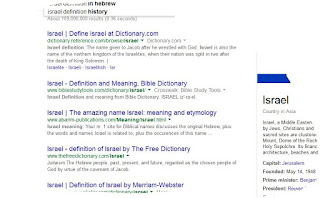German, Hebrew, and English studies have brought me to this:
Thoughts while listening to commentary on Micah 2:12-3:4 by Dr. J. Vernon McGee at TTB.org:
I've thought about this for a long time, and I don't know if it already exists, but I want to read a Bible without proper names; that is, one with capital letters only at the front of sentences. I believe that the usage of capital letters, as used in German for all nouns, or in English for proper nouns, confuses the meanings in Hebrew and in Greek; although I've never taken Greek. In Hebrew, the names mean something, and I'd like to read those words rather than thinking of the name as a character. Instead of an alliteration or an Anglicized version of the sound, we should use a word that means the same thing as the Hebrew word; not one that sounds somewhat like the original or one that brings to mind a familiar character for which we supply our own interpretations built upon repetition and tradition and preconceived ideas.
We do this in fairy tales and so we English readers know simultaneously that Snow White is a particular princess, and what her name means. But in the Bible, the meanings of names are obscured due to over-translation, and this is not good in a language that relies on meanings of words and meanings of names in particular; and in which so many main characters experience name changes. There aren't that many words in Hebrew, so we shouldn't be dividing them up into 15 words in English, but learning them for what they say so that when we study a word we have some idea of the times it is used before we start talking about its meaning. I want to be able to read passages about Jacob as being about that character, but also as passages about Trickster, or about a trickster, if that's what Jacob means.
Here's what a Google search about the meaning of Israel netted me today:
You may not be able to read it, but I believe that if you could, you'd find out less than I did, because I knew what I was looking for and I know it wasn't there.
I am amazed at how divisive the Bible is. So many people swear they believe it, yet they have no idea what 90% of it says. And then there are so many people who think of it as rubble, old and smoking; on its way out of relevance, who have no idea what 91% of it says.
Here, in his daily commentary, Dr. McGee states that the name Jacob is used to refer to the same people as Israel, but Jacob is their sin, or old nature and Israel is the new. I'd like to read the word with the meaning, and not be distracted by the name and the associations I place upon it about sheep and goats and distractingly hairy men lying and cheating and eating red stew. It's important to know who Jacob and Israel are, but they're many things: a real person with two names, a real nation or people group with two names, and a character or characters in the story of one man, and the character or characters of a people group in the history of them and in their story as presented as well. Then after those obvious things are understood, one could see what the words say about tricksters in general, for a look at Scripture on several levels. When I read something about Snow White, I don't have to think too hard to interpret that thought as something that pertains to white people, because I know that her name means white and I know she's a person, but if I don't know what a Bible name means....

No comments:
Post a Comment